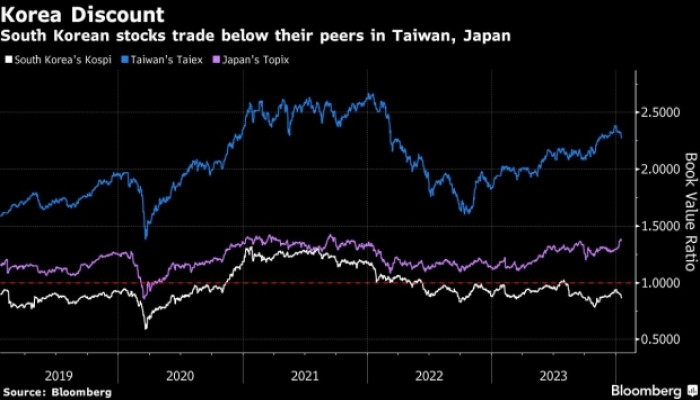South Korea unveils Corporate Value-up Programma to replicate Japan
- In Reports
- 11:47 AM, Feb 26, 2024
- Myind Staff
South Korea's highly anticipated initiative to encourage companies to enhance their management and corporate governance fell short of investor expectations due to a lack of enforcement and specific details. This disappointment resulted in a decline in local stocks.
Under the "Corporate Value-up Program," companies that prioritize shareholder returns in their management practices will receive "bold incentives" and tax benefits, as announced by the Financial Services Commission in a statement on Monday. The guidelines for this program are expected to be finalized in June, according to the financial regulator.
In the third quarter, the country plans to introduce the "Korea Value-up Index," similar to Japan's JPX Prime 150 Index, consisting of companies demonstrating exemplary practices. This index will serve as a benchmark for pension funds and other institutional investors. Additionally, new exchange-traded funds, set to be launched in the fourth quarter, will have the capability to track the Korea Value-up Index, the FSC said.
“The disappointment comes from the fact that companies are not required to take any actions in the short term,” said Seol Yongjin, an analyst at SK Securities Co. “Investors expected specific incentives to be announced today but now the government said those details will be disclosed later this year.”
Korean stocks experienced a rally in the past month, fueled by consistent government statements on reform measures, as President Yoon Suk Yeol aimed to address the "Korea Discount" associated with local shares. However, as the revealed measures primarily hinge on voluntary initiatives, the Kospi fell over 1% on Monday, underperforming most other Asian markets.
Global investors had eagerly anticipated the valuation-boosting initiatives, anticipating that they would prompt improved corporate governance practices in Asia's fourth-largest economy. The optimistic expectation was for a prolonged market rally similar to the one witnessed in Japan following similar changes aimed at enhancing management practices in Korea's neighbouring country.
The Tokyo Stock Exchange’s decision to name companies with poor shareholder returns was a key factor in spurring structural changes in the market and the Nikkei 225’s rally that surpassed its 1989 peak.
On Monday, foreign investors shifted to selling Kospi shares on a net basis, reversing a trend where they had accumulated 10.5 trillion won ($7.9 billion) throughout the year until the previous week, surpassing investments in any other Asian emerging countries. Financial and auto stocks experienced the most significant losses during morning trading.
“There are no specific ways on how the government would make companies follow the measures to improve their corporate value so there is a selloff on disappointment,” says Ahn Youngjun, an analyst at Hana Securities.
The Financial Services Commission (FSC) emphasized that companies' boards of directors should assume a pivotal role in formulating and executing mid to long-term improvement plans annually. These boards will be incentivized to voluntarily disclose their plans on their official websites and on the Korea Exchange platform.
The Korea Exchange will also publish significant financial indicators of listed companies categorized by sectors, such as the price-to-book ratio and return on equity. To support the program, the exchange operator plans to establish a dedicated department and an advisory board.
The financial regulator also said it will revise the stewardship code to ensure that pension funds and others consider companies’ value-up efforts when making investment decisions.
“There was speculative money buying last week and selling in reaction to today’s regulatory announcements which did not exceed expectations,” said Alan Richardson, a fund manager at Samsung Asset Management. “Nevertheless, the trend is positive and progress on Korea’s corporate value program is a continuing theme after elections.”
Image source: Bloomberg







Comments